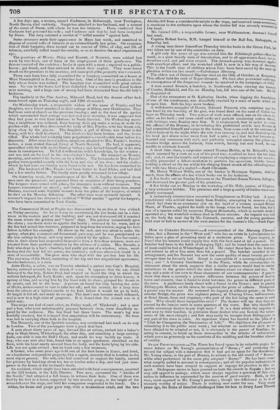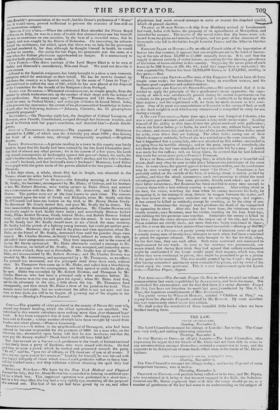How TO CHEAPEN PROVISIONS—A correspondent of the Morning Chronicle states,
that a Baronet in the" West end," who has an estate in Leicestershire has fallen upon a plan of procuring meat at a moderate price. Upon inquiry, he found that his tenants could supply him with the best meat at ad. a pound. His butcher had been in the habit of charging 7M; and he found that the same sort of meat could be had at Whitechapel at 5d. He stated these facts to his butcher, and refused to allow him more than (id. a pound. The butcher acceded to the arrangement, and the Baronet has now the same quality of meat twenty per cent cheaper than he formerly had. Bread is susceptible of a correspending‘redurs tion ; and " A Country Gentleman" in the Times, while he corroborates the statement about the meat, suggests that a similar process would lead to similar reductions in the prices which the retail dealers exact tor cheese and tea. We may add a mite of our own to these statements of our contemporaries: it goes to show that there is scarcely a greater difference between the prices of food mu town and country, than is found to exist between the prices us different parts of the town. A gentleman lately dined with a friend in the Tower; and in passing Billingsgate Market, on his return, he inquired the price of saltnon. Ninepeoce a pound was the answer. He renewed his inquiry at different points : at Wee!Muster Bridge, the price was eighteen pence; at Charing Cross. half-a-crown; at Bond Street, three and sixpence,—the part of the fish being the same in each case. Why should these inequalities exist? The dealers will say that they are caused by the heavier rents in some quarters of the town. But why should the public encourage dealers to pay high rents ? It is a duty which the majority of men owe to their families, to patronize those dealers who can furnish the necessaries of life most cheaply ; and fish may easily be brought from Billingsgate to any part of the town in carts. An ingenious friend has handed us the plan of it " Club for Cheapening the Necessaries of Life." We shall have the pleasure ot submitting it to the public next week ; but whether an institution such as we have alluded to be adopted or not, it is obviously in the power of families, by acting in concert, to break up these monopolies in the articles of subsistence, which press so grievously on the comforts of the middling and the humbler classes of society. STAGE PRONPNCIATION.—The Times has found space in its valuable pages for seven letters on Mr. Young's pronunciation of " Rome ; " and yesterday dismissed the subject with a statement that it had got no space for the discussion; Mr. Young chose, in the part of Brutus, to adhere to the old sound of " while other performers in the same play adopted " Rome." He has been s.onicwhat roughly called to account in consequence ; and all the popular authorities iii such matters have been arrayed to support or impugn his practice in this respect. Shakspeare seems to have punned on both the sounds in dispute : but we may still appeal to analogy, which must always regulate a question of this sort, unless its influence be superseded by the custom of good society. Both,.in. this case, seem opposed to Mr. Young's practice ; though the difference is In it elf scarcely worthy of notice. There is nothing new under the sun. Very many years ago, the Duke of Beaufort challenged from his box in Drury Lane Theatre john Kemble's pronunciation Of the word ; but his Grace's preference of " Rome" le:, it would seem, proved ineffectual to prevent the exercise of free-will on se: momentous subject. enmanee Coot'n'cmite—When the celebrated Rust attended the Prince Royal of Pruisia to Italy, he was in a state of health that alarmed every one but himself. lie yeas so overcome on one occasion, by tine heat of a crowded room, that he fainted, and was caught by the Prince of Hohenloe. On recovering, he acknowledged the assistance, but added, apart. that there was no help for the personage ho had rendered it, for that, although he thought himself in health, he would net live six months. On seeing the late Pope, his prognostic was the same, at a wee when the Italian physicians apprehended no danger. It is unnecessary to add, that both predictions were verified.
CITY FINERY.—The dress carriage of the Lord Mayor Elect is to be seen at • Stubbs and Hancock's manufactory, Mile-end Road. We need not describe it cannut.
A friend to the Spanish emigrants, has lately brought to a close a very romantic enterprise which he undertook on their behalf. He has for mon-hs roamed up and down the country as a Spanish minstrel, by the name of "-Juan de Vega ;" al,d contrived to collect the sum of 58/., which he has now placed at the disposal of the Committee for the benefit of the Etnigrants from Portugal.
NAMES AND Numeees.—Whimsical mistakesoccur, to simple people, from the manner in which tradesmen mix up the number of their shops with the notices of their professions. Not many years e "Thompson and 135 Sons, Hosiers," eight be seen in Oxford Street ; and a disciple of Galen in Greek Street, Soho, at the present day announces the extent of his pharmaceutical knowledge in letters of guld,after the following fashion—" Johnson, Chemist, Stc. 15 prescriptions accurately prepared."
ELOPEMENT.—On Thursday night last, the daughter of Colonel Youngson, of Bow-scar, near Penrith, Cumberland, escaped through her bedroom window, and rat off to Gretna with her papa's coachman, and married hins !—Leeds Intelligencer.
COST OF A TRIUMPHANT Aceumme—The expenses of Captain Dickinson amounted to 1,2001., of which suns the Admiralty pay about SOW.; thus leaving him loser of a serious sum, although triumphantly acquitted.—Breektort Gazette.
FAMILY DiSTINCTIONS.—A person residing in a town in this county was lately heard to boast that his family had been noticed by the late Lord Chancellor more than that of almost any other person ; for in the course of a few years, his Lordslip issued commi,ssions of bankruptcy against this person's father, his uncle, his nache's brother-in-taw, his uncle's cousin, his wife's mother, and his wife's brother, his sister's husband, and that husband's sister's husband ! Moreover, Lord Eldon ease pupil with the great uncle of the person alluded to for two years.—Duream Chronicle.
A few days since, a whale, about' fifty feet in length, was observed in the Thames, about ten miles below Gravesend.
"AFFAIRS OF HONOUR" IN Dueree.—On Saturday morning, at four o'clock Mr. Scully, the barrister, accompanied by Mr. Blake, of Galway, and his brotherin law, Mr. Robert Browne, were taking oysters in Duke Street, and entered into a conversation with the Rev. Mr. Grady, Mr. Armstrong, and Mr. Charles Browne. The parties were not at the time known to each other. The conversation turned upon the trial of Grady and Richards, when Mr. Scully said that Mr. O'Connell had been too lenient on the trial, to Mr. Henry Deane Grady. The Reverend Mr. Grady denied tins, and gave Mr. Scully the lie direct. The latter immediately demanded gentlemanly satisfaction. Mr. Charles Browne said that Grady ought to kick Scully down stairs; and accordingly Browne kicked Scully, Blake kicked Browne, Grady kicked Blake, and Robert Browne kicked Grade, until they literally kicked each other into the street. It was then agreed that Mr. Grady and Mr. Scully should meet, at six o'clock the same morning. Mr. Scully had the pistols of a fighting young baronet, but could get neither powder nor balls. However, they all met at the place and time appointed, when Mr. Bloke, as the friend of Mr. Scully, demanded time until the powder shops were opened. Mr. Charles Browne, as Grady's friend, refused to concede this right, and called their antagonists cowards. They then separated, and in the course of the day Mr. Grady apologized. Mr. Blake afterwards carried a message to Mr. Charles Browne, on behalf of Mr. Scully, It was accepted, and yesterday mornrig, at seven o'clock, they met at Portobello. Mr. Scully was arended by Mr. Blake, and accompanied by Mr. Robert Browoe; and Mr. Charles Browne was attended by Mr. Armstrong, and accompanied by a Mr. Thompson, an ex-officer. The ground was measured, and the principals fired three shots each, without effect. Mr. Thompson then came up to Mr. Blake, and called him a bloodthirsty fellow. A message was the consequence, and they agreed to settle the affair on, the spot: Blake was seconded by Mr. Robert Browne, and Thompson by Mr. Charles Browne, who had been a principal only a few minutes before. Mr. Charles Browne won the toss and gave the signal ; when Mr. Blake fired first, and hit his adversary in the side, a little above the hip. Mr. Thompson fired subsequently, and then struck Mr. Blake a blow of his pistol on the head. Thus matters stood last night ; but we understand the affair is not yet over, and that three or four duels are still to be fought, all growing out of the dispute in the oyster-shop.—Monday's Freeman's Journal.



















 Previous page
Previous page